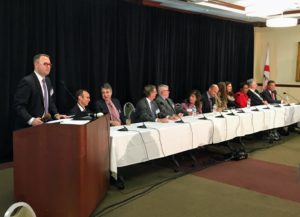|
Rule
|
Change
|
Source
|
|
Fla. R. Jud. Admin 2.514Â [.pdf, entire rule set]
|
- When a period is stated in days or a longer unit of time, “begin counting from the next day that is not a Saturday, Sunday, or legal holiday.â€
- 5 days added for only traditional mailing. No more days for
electronic service.
|
SC17-882, p. 9
|
|
Fla. R. Jud. Admin 2.516Â [.pdf, entire rule set]
|
- E-Mail service no longer treated as mail service for computation of time.
|
SC17-882, p. 10
|
|
Fla. R. App. P. 9.010
|
- Added applicability of Fla. R. Jud. Admin (formerly in 9.020(h)).
|
SC17-152, p. 22
|
|
Fla. R. App. P. 9.020
|
- Removes section regarding Fla. R. Jud. Admin.
- Reorganizes subsection on motions tolling rendition (without substantive change).
- Defines “conformed copy.â€
- Other format changes, renumbering of subsections.
|
SC17-152, pp. 22-24
|
|
Fla. R. App. P. 9.030
|
- Non-substantive changes only.
|
SC17-152, pp. 25-27
|
|
Fla. R. App. P. 9.040
|
- Non-substantive changes only.
|
SC17-152, pp. 27-28
|
|
Fla. R. App. P. 9.100
|
- Non-substantive changes only.
- A reply is due within 30 days of the response.
|
SC17-152 pp. 29-30
SC17-882, p. 16
|
|
Fla. R. App. P. 9.110
|
- Clarifies that scope of review in partial final judgments limited to any matter or ruling prior to filing of notice that is directly related to the aspect of the
judgment under review.
- Notice of cross-appeal must be served “within 15 days of service of the appellant’s timely filed notice of appeal or within the time prescribed for filing a notice of appeal, whichever is later.â€
|
SC17-152, pp. 30-32
SC17-882, pp. 16-17
|
|
Fla. R. App. P. 9.120
|
- Omits requirement of appendix for initial brief on the merits in discretionary review over district court decisions.
- Respondent’s brief on jurisdiction must be served within 30 days of service of petitioner’s brief.
|
SC17-152, pp. 32-33
SC17-882, p. 17
|
|
Fla. R. App. P. 9.125
|
- Omits specific format for signature block on certification in form for pass-through appeals to supreme court.
|
SC17-152, pp. 33-34
|
|
Fla. R. App. P. 9.130
|
- Adds two new categories to the list of nonfinal appealable orders: “that, as a matter of law, a settlement agreement is unenforceable, is set aside, or never existed;†and “grant or deny a motion to disqualify counsel.â€
- Notice of cross-appeal must be served “within 15 days of service of the appellant’s timely filed notice of appeal or within the time prescribed for filing a notice of appeal, whichever is later.â€
|
SC17-152, pp. 35-36
SC17-882, p. 18
|
|
Fla. R. App. P. 9.140
|
- Attorney of record for appellant must serve designations to be served on the court reporter, and service must occur before attorney of record will be allowed to withdraw from representation on appeal.
- Modifies the return of the record rule to require return of only non-electronically filed parts of the record after final disposition of the appeal.
- When a 3.800(b)(2) motion is filed, the clerk must supplement the appellate record with the motion, any response, any resulting order, and any motion for rehearing, response, and order on the motion. The supplement must be filed within 20 days after filing of the order disposing of the motion. If no order is filed within 60 days, the 20 days runs from the end of the 60-day period and requires a statement in the supplement that no order was timely filed. If a motion for rehearing is filed, the clerk must transmit the supplement within 5 days of the order disposing of the rehearing. If no order issues within 40 days, the 5-day period runs from the end of the 40-day period, and the supplement must include a statement that no order was timely filed.
- “A defendant may cross-appeal by serving a notice within 15 days of service of the state’s notice or service of an order on a motion pursuant to Florida Rule of Criminal Procedure 3.800(b)(2).â€
- “[I]n an appeal by the state under rule 9.140(c)(1)(K), the state’s notice of cross-appeal shall be filed within 15 days of service of defendant’s notice or service
of an order on a motion pursuant to Florida Rule of Criminal Procedure
3.800(b)(2).â€
|
SC17-152, pp. 38-39
SC17-882, p. 19
|
|
Fla. R. App. P. 9.141
|
- Requires the clerk to index, paginate, and send to parties the record on collateral and postconviction cases.
- Allows for directions to clerk within 10 days of notice of appeal.
- A reply may be served within 30 days after service of the response.
|
SC17-152, pp. 42-43
SC17-882, p. 20
|
|
Fla. R. App. P. 9.142
|
- Non-substantive changes.
- The briefing schedule allows that the state has 50 days from the date the defendant’s brief is served, and the defendant has 40 days from the date the state’s brief is served.
- In petitions seeking review of nonfinal orders in death penalty postconviction proceedings, the petitioner may serve a reply within 30 days of the State’s response.
|
SC17-152, pp. 44-46
SC17-882, pp. 20-21
|
|
Fla. R. App. P. 9.145
|
- Non-substantive changes
only.
|
SC17-152, pp. 47-48
|
|
Fla. R. App. P. 9.146
|
- In juvenile dependency, TPR, and cases involving families and children in need of services, mandates that review of trial court orders on motions seeking a stay pending appeal shall be by motion.
- Adds detail for briefing schedule in cases in which more than 1 initial or answer brief is authorized.
- When an order issues allowing counsel to withdraw, counsel must within 5 days certify that counsel has forwarded the record and transcripts to the parent or is
unable to do so after making diligent efforts to find the parent.
- In Dependency and TPR appeals, the initial brief shall be served within 30 days of service of the record or index. The answer brief shall be served within 30 days of the initial brief. The reply brief shall be served within 15 days of the answer brief.
|
SC17-152, pp. 48-50
SC17-882, p. 22
|
|
Fla. R. App. P. 9.150
|
- Non-substantive changes only.
|
SC17-152, p. 50
|
|
Fla. R. App. P. 9.160
|
- Non-substantive changes only.
|
SC17-152, pp. 50-51
|
|
Fla. R. App. P. 9.170
|
- A party choosing the “alternative appendix†method must serve a copy of the direction to the appellate court as well as the lower tribunal.
- If another party directs the preparation of record, that direction must be served on the appellate court when served on the lower tribunal.
|
SC17-152, pp. 51-52
|
|
Fla. R. App. P. 9.180
|
- Requires a judge of compensation claims to select an approved court reporter and transcriptionist.
- Deposit of estimated costs due within 20 days of service of notice of estimated costs.
- Written objections to selected court reporter or transcript due within 20 days of service of notice of selection.
- Verified petition to be relieved of costs must be filed within 20 days after service of the notice of estimated costs.
- Lower tribunal may enter an order on the merits of a petition to be relieved of costs without an objection filed after 30 days following the service of the petition.
|
SC17-152, pp. 53-57
SC17-882, pp. 23-24
|
|
Fla. R. App. P. 9.190
|
- Removes reference to section 120.56 (rule challenges) in procedures for proceedings involving disputed issue of fact.
- Creates new subsection for procedures for appeal from rule challenge proceedings under section 120.56.
|
SC17-152, pp. 57-61
|
|
Fla. R. App. P. 9.200
|
- Requires service of designations to court reporter upon the court reporter or
transcriptionist.
- Reorganizes requirements of court reporter upon receipt of designation, moves to different subsection.
- Moves requirements for organization of transcripts in the record to its own subsection.
- Objections or amendments to proposed statement of evidence or proceedings must be served within 15 days of service of the proposed statement.
- The cross-appellee has 15 days to direct the clerk to include additional documents, exhibits, or transcripts from the service of the cross-directions.
|
SC17-152, pp. 61-63
SC17-882, p. 25
|
|
Fla. R. App. P. 9.210
|
- Clarifies that briefs filed in electronic version need not be also filed in paper.
- Cover sheet of brief now requires email address of attorney filing the brief.
- Formalizes the “one attorney, one brief†rule.
- If more than one initial or answer brief is filed, the responsive brief is due to be served within 20 days after the last prior brief. If the last brief is never served, the time runs from the date on which it was due to be served.
- “Unless otherwise required shall be served within 30 days after service of the initial brief; the reply brief, if any shall be served within 30 days after service of the answer brief; and the cross-reply brief, if any, shall be served within 30 days thereafter.â€
|
SC17-152, pp. 64-65
SC17-882, pp. 25-26
|
|
Fla. R. App. P. 9.225
|
- Non-substantive changes only.
|
SC17-152, p. 66
|
|
Fla. R. App. P. 9.310
|
- Non-substantive changes only.
|
SC17-152, p. 66
|
|
Fla. R. App. P. 9.320
|
- Request for oral argument due 15 days after the last brief (or the reply in a petition proceeding) is due to be served.
|
SC17-882, pp. 26-27
|
|
Fla. R. App. P. 9.330
|
- Adds “written opinion†to the title of the rehearing and clarification rule.
- Details requirements for a motion for certification.
- Details and outlines requirements for a motion for written opinion.
- Eliminates the requirement for a certification for a motion for a written opinion.
- “All motions filed under this rule with respect to a particular order or decision must be combined in a single document.â€
- Clarifies that rule only applies to orders that resolve appeals, original proceedings, or motions for appellate proceedings. Does not limit inherent authority to reconsider nonfinal appellate orders.
- “A response may be served within 15 days of service of the motion.â€
- In bond validation proceedings, a “reply may be served within 10 days of service of the motion.â€
|
SC17-152, pp. 66-69
SC17-882, p. 27
|
|
Fla. R. App. P. 9.331
|
- Court will now notify parties once it decides to determine a proceeding en
banc.
- Signature block under required statement for rehearing en banc omitted.
- “A response may be served within 15 days of service of the motion.â€
|
SC17-152, pp. 69-70
SC17-882, p. 28
|
|
Fla. R. App. P. 9.350
|
- In a 9.120 proceeding, a notice of voluntary dismissal does not become effective until the later of 10 days following service of the notice to invoke discretionary
jurisdiction or 10 days after the time prescribed by rule 9.120(b)
- In a 9.120 proceeding, a notice of voluntary dismissal does not become effective until the later of 15 days following service of the notice to invoke discretionary
jurisdiction or 10 days after the time prescribed by rule 9.120(b).
|
SC17-152, pp. 71-72
SC17-882, p. 28
|
|
Fla. R. App. P. 9.360
|
- Clarifies that joinder is only realignment of existing parties to appeal; it does not allow addition of new parties parties. Rephrases procedures for joinder as seeking realignment from appellee or respondent to appellant or petitioner.
- The body of the notice shall reflect a new proposed caption. Clerk will change the caption upon receipt of notice and payment of fee.
|
SC17-152, pp. 72-73
|
|
Fla. R. App. P. 9.370
|
- Leave of court is required to serve an amicus brief in regards to rehearing, rehearing en banc, or certification to the supreme court.
- Notice of joinder must be served within 15 days of the notice of appeal or petition.
|
SC17-152, pp. 72-73
SC17-882, p. 290
|
|
Fla. R. App. P. 9.380
|
- NEW RULE – Notices of related case or issue are now required to be filed. No argument allowed.
|
SC17-152, p. 74
|
|
Fla. R. App. P. 9.400
|
- Adds time limits for filing a motion for fees in discretionary proceedings under rules 9.030(a)(2)(A) and 9.030(a)(2)(A)(v).
- 9.030(a)(2)(A) – no later than time for serving the respondent’s brief on jurisdiction, or if jurisdiction is accepted, the time for serving the reply brief.
- 9.030(a)(2)(A)(v) – no later than 5 days after filing of the notice, or if jurisdiction is accepted, the time for serving the reply brief.
|
SC17-152, pp. 74-75
|
|
Fla. R. App. P. 9.410
|
- Omits signature requirement following the certification of service.
- Initial service of the motion must be no later than the time for serving a permitted response to the challenged document or, if no response is permitted, within 20 days after the service of the challenged document or the presentation of argument at oral argument.
- Respondent has 15 days from final service of a motion to serve response.
|
SC17-152, pp. 74-76
SC17-882, p. 30
|
|
Fla. R. App. P. 9.420
|
- Clarifies that service of petitions invoking original jurisdiction shall be by both e-mail and paper format.
|
SC17-152, pp. 77-78
|
|
Fla. R. App. P. 9.430
|
- Non-substantive changes only.
|
SC17-152, pp. 78-79
|
|
Fla. R. App. P. 9.500
|
- Clarifies governing provision of Florida Constitution, requires court to allow interested persons to be heard once request is determined to be within the purview of the applicable provision.
- The justices must file their opinions not less than 10 days from date of request unless delay would cause public injury.
- The governor shall be advised in writing.
|
SC17-152, pp. 79-80
|
|
Fla. R. App. P. 9.510
|
- Procedures for advisory opinions to attorney general modified.
- Requires justices to render their opinions no later than April 1 of the year in which an initiative is to be submitted to the voters pursuant to article XI, section 5 of the Florida Constitution.
|
SC17-152, pp. 80-81
|
|
Fla. R. App. P. 9.700
|
- Non-substantive changes only.
|
SC17-152, p. 81
|
|
Fla. R. App. P. 9.710
|
- Non-substantive changes only.
|
SC17-152, pp. 81-82
|
|
Fla. R. App. P. 9.720
|
- Non-substantive changes only.
|
SC17-152, pp. 82-83
|
|
Fla. R. App. P. 9.800
|
- Numerous amendments to the citation rule.
|
SC17-999
|
![[Advertisement for Hoyt's German Cologne and Rubifoam for the Teeth, both manufactured by E.W. Hoyt & Co., Lowell, Mass., illustrated with girl and Ladies Calendar for 1889] . Sourced from the Library of Congress at https://lccn.loc.gov/98505236](https://floridaappellate.com/wp-content/uploads/2018/10/Calendar-186x300.jpg)

![[Advertisement for Hoyt's German Cologne and Rubifoam for the Teeth, both manufactured by E.W. Hoyt & Co., Lowell, Mass., illustrated with girl and Ladies Calendar for 1889]](https://floridaappellate.com/wp-content/uploads/2018/10/Calendar-180x180.jpg)



